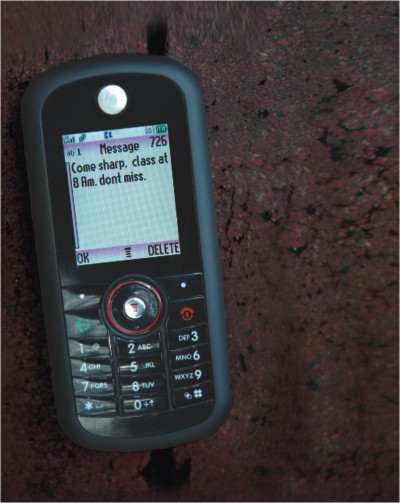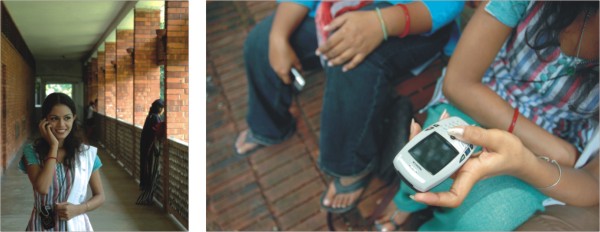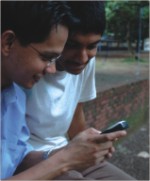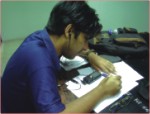|
Spotlight
The talkative genre
Mahdin Mahboob & Feeda Hasan Shahed

Human beings love to talk. They have been talking since oral sounds were given meaning by some wise people in the times now lost in antiquity. In the past, people used to talk to express important thoughts. Today, it appears, most people most of the time talk to express meaningless thoughts. Some do not even have any thoughts. These are thoughtless talks! And how most of those thoughtless talks get exchanged along with some thoughtful ones? Obviously through that tiny machine we so love to have! Yes, the tiny winy cell phone! Imagine life without one!
Last week we have secretly observed why and how the present genre has turned into a talkative genre!! The facts we collected are amazing and we present them this week for you. Enjoy reading, not talking!
 Abir woke up by the sound of the alarm from his cell phone. After connecting the phone to the charger he got ready for a long day classes, assignments, quizzes, projects and things of the sort. On his way to the university, he tuned in to the radio stations and started checking all the new sms that he'd received. Anila's sms made his day! She'd finally agreed to have lunch with him. But the next message brought down the skies upon him. Today was the last day of submission of the Finance project and he was not even half way through it! Abir woke up by the sound of the alarm from his cell phone. After connecting the phone to the charger he got ready for a long day classes, assignments, quizzes, projects and things of the sort. On his way to the university, he tuned in to the radio stations and started checking all the new sms that he'd received. Anila's sms made his day! She'd finally agreed to have lunch with him. But the next message brought down the skies upon him. Today was the last day of submission of the Finance project and he was not even half way through it!
For most of the university students like us today, cell phone has become a part and parcel of our lives. Like it or not, it has become almost unthinkable for us to imagine a day without the cell phone. How else can we maintain contact with friends or family? Is it really possible to function without it? After making a quick survey in some universities in Dhaka city, we have tried to find the answers to some of these questions.
The advantages are too many…
Cell phone has come as a blessing for many people in Bangladesh, especially for students, since this handheld device has made communication easier compared to earlier days. Starting from keeping contact with friends and family to discussing topics before the exam, and maintaining all other contacts, the cell phone has become an essential commodity in our everyday lives. Parents, who constantly remain worried about our well being, call us to know our whereabouts when we are late for home, stuck in some work or the other. Lots of students come to Dhaka from different parts of the country to attain higher degree in the different universities of the capital city. They usually live in dorms or rented hostels where the number of land phones is quite inadequate. Now, with most of the students having a personal means of communications, parents can stay relieved, being able to call their sons and daughters whenever they please. On the other hand, students can remain connected with his or her family. This also allows them to seek help whenever needed regarding financial support to buy academic materials and pocket money as well as moral support before exams. We saw many of our friends calling their mother after giving a bad exam.
 |
Apart from these, cell phones are used for a variety of reasons by the university students. The friendly atmosphere of the campus helps create new friends. Slowly but steadily the phonebook starts getting bigger as the number of friends grows higher. No doubt, cell phones are a very successful instrument to maintain friendship all over the campus.  At the same time many choose their life-partners from this educational time-period. As a result, cell phones carry high responsibilities among girl friends and boy friends. Not just calling, missed-calling and text messaging is equally popular among students. It is not uncommon to see a group of students sitting at tables in canteens or beside food courts with their mobiles out on the table or in front of them. At the same time many choose their life-partners from this educational time-period. As a result, cell phones carry high responsibilities among girl friends and boy friends. Not just calling, missed-calling and text messaging is equally popular among students. It is not uncommon to see a group of students sitting at tables in canteens or beside food courts with their mobiles out on the table or in front of them.
The use is so continuous and vast that sometimes it seems very unusual not to see a student carrying or rolling, calling or messaging, gaming or framing with his or her cell phone.
Sometimes students in the group would abstain from the conversations for a few minutes to 'fiddle' with their telephones. One might assume the conversation was not creating interest to them and they found more amusement playing with the games on their mobiles. They often message other friends to see if they were coming out and telling them where the group was.
 The text message has indeed become an accepted and every day method of communication for students as mobile telephone users, who are exploring the possibilities of the medium, creating purpose and relevance to both the caller and the receiver. The text message has indeed become an accepted and every day method of communication for students as mobile telephone users, who are exploring the possibilities of the medium, creating purpose and relevance to both the caller and the receiver.
In the same way as they commonly say “I'll give you a ring” for whatever reason, now one increasingly hears “I'll text you”showing that this habit is becoming a more frequently used one.
For some, text messaging adds an extra dimension to conversations and communication, for they can enable people to exchange snippets of information that may not in themselves warrant a full call. This appeared to be the opinion of many of our male friends that they view telephone communication as a method of relaying information.
Irrespective of subtleties, the mobile telephone does cut across gender differences. Both male and female students look upon the text messaging as mode of communication that not only fits their budgets, but which can be integrated into the cultural framework of there lives. They can be discreet, fun, rude, silly, practical, and versatile, while also enabling the user to communicate in situations where a traditional call may be inappropriate.
The multimedia option is also very popular among students. On most of the occasions we saw massive camera usage against a few digital cameras. Having a camera in the handset gave them the sovereignty not to carry digital camera separately. Sakibul Ahsan Jamaal, a 4th year student of Dhaka University said, “Having a camera in your cell phone lets you capture almost everything around. And you can instantly exchange photos with your friends through Bluetooth' or infrared where a digital camera doesn't have the option. Moreover you can forget your camera, but can you forget your dearest cell phone?”
 Atikur Rahman Kaju is pretty happy with the Mp3 player option. Starting from classes to canteens he is seen with headphones on. On an average he listens to about 30 songs a day. Atikur Rahman Kaju is pretty happy with the Mp3 player option. Starting from classes to canteens he is seen with headphones on. On an average he listens to about 30 songs a day.
A.H.M. Saifur Rahman Pushpo uses the GPRS to download ringtones, wallpapers in his cell phone.
But there are abuses too!
From the survey we found that the female students are the primary victims of cell phone abuse. Starting from receiving unwanted text message and continuous missed calls, this sort of harassment is unending. Even taking pictures without permission and sharing it with friends is a common phenomenon in all places.
Common Characteristics of a university student using his or cello phone
1. Outgoing calls are one-fifth of incoming calls and furthermore outgoing calls are converted to incoming calls through missed calls.
2. Incoming calls are amazingly huge in number. TNT incoming facility facilitated this process better.
3. In the beginning, the bills were paid by the parents. But with new relations developing a good amount of income from tuitions and part time jobs are included in the 3rd and 4th year of student life.
4. Pictures, songs, ringtones, wallpapers are downloaded through internet and GPRS options but exchanged through Bluetooth and infrared only.
5. Almost every cell phone holder uses it as an alarm clock and calendar.
 What students say… What students say…
While asking students about the different uses of their cell phones, we came across quite a few interesting answers. Riaz Md. Mony, a student of BRAC University says, “When somebody needs blood, in most of the cases, they first contact Shondhani or some other blood donation organization but these organizations do not always have the matching blood groups. So, one solution is to look for personal contacts to know who will be willing to donate blood or can help in finding some donor. The cell phone can play a vital role here. When we save someone's mobile number, we can also save his/her blood group together with the name, so when someone needs blood, you know whom to call”.
Shehran-E-Sattar, a 3rd year Dhaka University student uses his cell phone to find tuitions for his own. Using text message option he used to send sms to all his friends requesting them to contact him whenever they need for their relatives and family.
The DOs and the DON'Ts
Our cell phones are usually one of our most prized possessions, so we should take good care of it. It should never be subject to heat, water or any from of damage. The newer, flashier sets are even more sensitive to damage. So one needs to be careful about the way one use it. Do not overcharge it and abstain from the ill-practice of giving people missed calls just for fun! It takes up network bandwidth, thus depriving some other subscriber who has an important call to make.
Last words
Time changes in its own course. Time has changed drastically over the last ten years. The invention, and the rapid expansion, of multimedia technology have made life both smooth and complicated for all. It is up to people how they would use or abuse these technologies. If you are going for the latter, you are a abuseraren't you? But if are going for the former, then nothing like it. So be a USER of mobile!
We started this write-up with the story of Abir and Anila. You want to know what happened to them? Well, they are having a late lunch in the afternoon as Abir had to submit the Finance Project. Anila wasn't angry because we took pictures of Abir preparing the report which we showed her as evidences later to put things right among them. Little wonder why Abir sponsored an early supper for us in the evening that day!
Copyright
(R) thedailystar.net 2007
|
